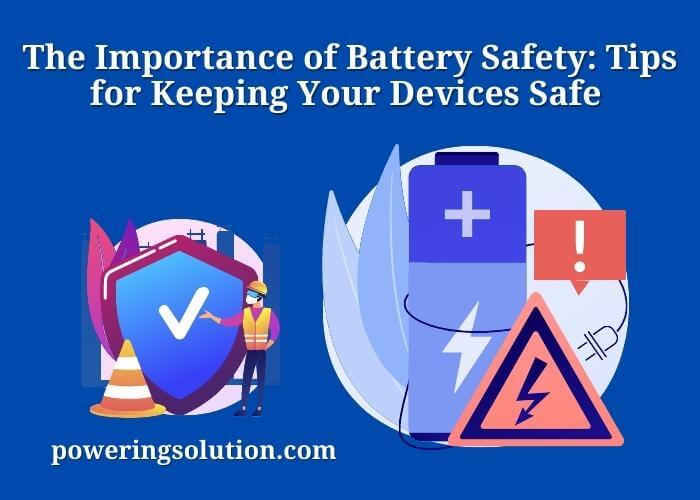In today’s world, we rely heavily on electronic devices to perform various tasks, whether it be for work or personal use. With this reliance, comes the importance of ensuring that these devices are safe and free from harm, especially when it comes to their batteries.

Battery safety is a critical aspect of keeping your devices functioning correctly, and it’s essential to take the necessary steps to maintain their safety.
What is Battery Safety?
Battery safety is an essential aspect of using electronic devices that are powered by batteries. Battery safety refers to the measures and precautions that one should take to ensure that batteries are used safely and do not cause damage or harm to the device or the user.
Batteries are a common source of power for many devices such as smartphones, laptops, cameras, and many more. There are different types of batteries, but the most commonly used are lithium-ion batteries. These batteries are rechargeable and widely used because they are lightweight, have a high energy density, and provide long battery life.
Lithium-ion batteries can also be dangerous if not used or handled properly. When batteries are damaged or exposed to extreme temperatures, they can malfunction and cause fires or explosions. Battery safety is critical because a damaged or exploding battery can lead to significant damage to the device and the user. In some cases, it can even cause injury or death.
To prevent battery damage and explosions, it’s essential to follow safety guidelines and take the necessary precautions. Users should read and understand the manufacturer’s instructions, including the recommended usage and charging methods for their devices. It’s also crucial to use the right charger for the device and avoid using counterfeit or incompatible chargers.
It’s important to avoid exposing the battery to extreme temperatures, such as direct sunlight or extreme cold. It’s also recommended to store the device in a dry, cool place, away from direct sunlight or sources of heat. If you notice a swollen battery, stop using the device immediately and handle it with care. Do not puncture or expose the battery to fire or water.
Battery safety is an essential aspect of using electronic devices. Users must take the necessary precautions to ensure that batteries are used safely and do not cause damage or harm. By following safety guidelines and taking the necessary precautions, users can help prevent battery damage and keep themselves safe.
The Importance of Battery Safety
The importance of battery safety cannot be overstated, as batteries are an essential power source for many electronic devices we use on a daily basis. Battery-powered devices, such as smartphones, laptops, cameras, and electric vehicles, have made our lives more convenient and efficient, but they also come with potential risks that must be taken seriously.
The following are some of the reasons why battery safety is critical:
Preventing Device Damage
A battery malfunction can cause significant damage to the device it powers. A damaged battery can cause a device to shut down unexpectedly, corrupt data, or even destroy the device entirely. A damaged battery can also cause physical damage to the device, such as melted plastic or shattered screens.
Personal Safety
The most critical reason for battery safety is to protect the user from harm. A malfunctioning battery can cause burns, fires, and even explosions. In extreme cases, the damage can be severe enough to cause injury or even death. By following battery safety guidelines, users can minimize these risks and keep themselves and those around them safe.
Environmental Protection
Improper disposal of batteries can also harm the environment. Batteries contain hazardous chemicals that can cause soil and water pollution. Recycling batteries is an excellent way to minimize the impact on the environment and prevent these toxic chemicals from contaminating the soil and water.
Saving Money
In addition to the cost of repairing or replacing a damaged device, battery safety can also save users money on their energy bills. Charging and discharging batteries correctly can help extend the battery life and reduce energy consumption.
How to Store Batteries Safely?
Storing batteries safely is important to avoid the risk of fires, explosions, and other hazards. Here are some tips on how to store batteries safely:

- Keep batteries away from heat sources and direct sunlight: High temperatures can cause batteries to leak or vent, which can result in fires or explosions. Store batteries in a cool, dry place that is away from direct sunlight, heaters, or other heat sources.
- Store batteries in their original packaging or a battery case: The original packaging is designed to protect batteries from damage and prevent them from touching other objects that could cause a short circuit. Alternatively, you can use a battery case to store your batteries. This will also prevent them from coming into contact with other objects that could cause a short circuit.
- Keep batteries out of the reach of children and pets: Batteries can be dangerous if they are ingested, so it’s important to keep them out of reach of children and pets. Store batteries in a secure location, such as a locked cabinet or a high shelf.
- Don’t store loose batteries in a drawer or container: Loose batteries can come into contact with other objects, which can cause a short circuit and lead to fires or explosions. Instead, store batteries in their original packaging or a battery case.
- Avoid storing different types of batteries together: Different types of batteries can have different voltage and chemical compositions, which can cause a short circuit if they come into contact with each other. Store different types of batteries separately to prevent any accidents.
If you have any doubts about the safety of your batteries, it’s better to err on the side of caution and dispose of them properly.
How to Dispose of Batteries Properly?
Disposing of batteries properly is an important aspect of battery safety. Batteries contain hazardous chemicals like lead, cadmium, and mercury that can harm the environment and human health. Here are some ways to dispose of batteries properly:
Recycle Your Batteries
One of the best ways to dispose of batteries properly is to recycle them. Many communities have battery recycling programs that accept different types of batteries, including alkaline, lithium, and rechargeable batteries. You can find battery recycling locations near you by checking with your local recycling center, waste management facility, or electronics retailer.
Use Battery Collection Programs
Battery collection programs are designed to collect used batteries and dispose of them safely. Many companies that sell batteries offer free battery collection and disposal programs. You can also find battery collection programs at electronic stores or online.
Do Not Throw Batteries in the Trash
Throwing batteries in the trash can harm the environment and contaminate the soil and water. Do not throw batteries in the regular trash; instead, dispose of them through a recycling program or collection program.
Use a Battery Disposal Container
If you cannot find a battery recycling program or collection program in your area, consider using a battery disposal container. These containers are specially designed to store used batteries and prevent leaks or spills. You can purchase battery disposal containers online or at hardware stores.
Follow State and Local Regulations
Some states and localities have regulations on how to dispose of batteries. Before disposing of your batteries, check with your local authorities to ensure that you are following the correct guidelines.
Tips for Ensuring Battery Safety
To ensure battery safety, it is crucial to follow some essential guidelines and take necessary precautions. Here are some tips for ensuring battery safety:
- Use the Right Charger: Always use the charger provided by the manufacturer to charge your device. Using counterfeit or incompatible chargers can damage the battery and even cause a fire or explosion.
- Avoid Extreme Temperatures: Avoid exposing your device to extreme temperatures, as high temperatures can cause the battery to overheat, while low temperatures can reduce battery performance. Avoid storing your device in direct sunlight or exposing it to extreme cold.
- Keep Your Device Dry: Moisture can cause damage to the battery and the device. Avoid exposing your device to water or damp environments. If your device gets wet, turn it off immediately and let it dry before turning it back on.
- Handle Damaged Batteries with Care: If you notice that your battery is swollen, stop using the device immediately and handle it with care. Do not puncture or expose the battery to fire or water.
- Charge Your Battery Safely: Always use a safe and stable surface to charge your device, away from flammable materials. Do not charge your device on your bed or sofa, as it can cause the battery to overheat and start a fire.
- Avoid Overcharging: Overcharging can damage the battery and reduce its lifespan. Always unplug your device from the charger when it reaches 100% battery capacity.
- Store Your Device Properly: Store your device in a dry, cool place, away from direct sunlight or sources of heat. Avoid storing your device in hot places like your car or in a place where the battery can be punctured or damaged.
These guidelines can help you prevent battery damage, extend battery life, and minimize the risks of accidents or injuries.
Final Words
Battery safety is a crucial aspect of using any device that is powered by batteries. Proper care and handling of batteries can help prevent damage to the battery, extend its lifespan, and minimize the risks of accidents or injuries. It is essential to use the right charger, avoid extreme temperatures and moisture, handle damaged batteries with care, charge batteries safely, and store devices properly.
It is essential to dispose of batteries properly to minimize their environmental impact and protect human health. Recycling batteries or using battery collection programs are some of the best ways to dispose of batteries safely.
Battery safety is everyone’s responsibility, and it is crucial to take the necessary steps to ensure that batteries are handled and disposed of safely. By doing so, we can enjoy the convenience and benefits of using battery-powered devices while protecting the environment and human health.
